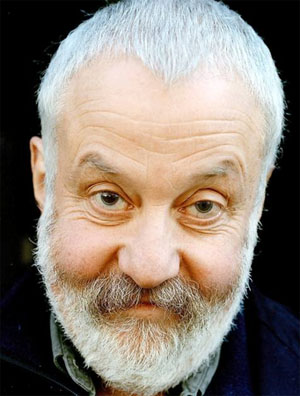Just last month, Mike Leigh was telling the Guardian‘s Laura Barnett about revisiting his first film, Bleak Moments: “I was 28, somewhat younger than my sons today. Inevitably, there is much I could criticize in my quirky old 1971 relic. But it was my first effort, and I’ve made 17 full-length films since, as well as having written and directed a dozen or so stage plays, including Abigail’s Party. So, praise first…. I guess I’m astonished at the maturity and sophistication of my achievement, not to mention its pathos and irony. But one doesn’t make films by oneself, and Bleak Moments was a consummate team effort…. Jean Renoir declared that we all go on making the same film over and over again. I agree. I’ve tried to vary my films considerably, but I would have to admit that Bleak Moments remains, in some ways, the mother of all Mike Leigh films. And I’m very proud of it.”
As he turns 70 today, Mike Leigh is preparing his next film, which will feature Timothy Spall as the British Romantic painter J.M.W. Turner. “I want to explore the man, his working life, his relationships and how he lived,” Leigh’s told the BBC. “But what fascinates me most is the drama that lies in the tension between this driven eccentric and the epic, timeless world he evoked in his masterpieces.”
Writing for Screen Online, Richard Dacre reminds us that, after Bleak Moments, it’d be 17 years before Leigh made another theatrical feature. Naturally, he kept busy in the interim, directing theater, nine television plays—and ultimately, High Hopes in 1988: “Much of the family drama was familiar to people from Leigh’s television work; but a renewed visual confidence appeared in scenes like the explosive family argument at the elderly mother’s surprise birthday party where the camera focuses hard on Edna Doré’s expressive face as voices are raised in anger around her. The film’s critical acclaim and relative commercial success, plus the support of producer Simon Channing-Williams, joint founder of Thin Man Films in 1989, established Leigh as a major British film director…. Although Leigh has been accused of patronizing his characters and encouraging the audience to look down and snigger at their antics, most of them, despite their eccentricities, are ordinary individuals courageously struggling with limited resources to confront life’s problems.”
“It is impossible to discuss Leigh’s work without discussing his working methods, even though there’s an unfortunate tendency amongst critics to fetishize these to the point of ignoring what the resulting films are actually all about,” write Julian Petley and Robyn Karney for Film Reference. “Leigh himself has referred to such writings as ‘an albatross, a media preoccupation,’ but since misunderstandings abound and are often used as a basis on which to attack his work, it is important to understand what he is doing. In fact, his methods have changed little since he developed them in the theatre in the mid-1960s. As he said in 1973: ‘I begin with a general area which I want to investigate. I choose my actors and tell them that I don’t want to talk to them about the play. (There is no play at this stage.) I ask them to think of several people of their own age. Then we discuss these people till we find the character I want.’ Each actor then builds up his or her own character through a lengthy process of research and improvisation, both in the rehearsal room and in real locations. Only when the actors have fully “found” their characters are they brought together and the all-important relationships are formed between the characters: the play is what happens to the characters, what they make for themselves. Behavior dictates situation.”
In 2010, the Telegraph‘s Marc Lee wrote up what he considered to be Leigh’s ten best films: Bleak Moments, Nuts in May (1976, featuring a couple “who rank among the most memorable and best-loved characters in the whole of Leigh’s oeuvre”), Abigail’s Party (1977, featuring Alison Steadman, “who was married to Leigh from 1973 to 2001…, as the monstrous Beverly”), High Hopes, Life Is Sweet (1990, an “amiable satire about social tensions featuring likable working-class couple Cyril [Phil Davis] and Shirley [Ruth Sheen], Cyril’s doddery old mum and her awful, braying upper-middle-class neighbors [Lesley Manville, David Bamber]), Naked (1993, Leigh’s “grimmest tale,” featuring “David Thewlis as Johnny, an angry, articulate, blackly philosophical character on the run from a deplorable sexual encounter”), Secrets & Lies (1996, “Serious issues are addressed, but—and this is typical of Leigh’s films—that doesn’t mean it isn’t funny and heart-warming, too”), Career Girls (1997, a “less intense piece than many of his other films”), Vera Drake (2004, “Possibly Leigh’s most heartfelt film”), and Happy-Go-Lucky (2008, “and there’s no irony in that title”).
Let’s throw in a mention of Topsy-Turvy (1999), a “sumptuous and hugely entertaining… period musical-comedy about the making of Gilbert & Sullivan’s The Mikado,” as the AV Club‘s Scott Tobias has put it, adding that it’s “a major departure, but it may also be his most personal work to date, an affectionate nod to the theater brimming with sharp insights into the artistic process.”
For more on Leigh, see his pages in the New York Times and They Shoot Pictures, Don’t They? And Patrick Bahners salutes Leigh in today’s Frankfurter Allgemeine Zeitung.
For news and tips throughout the day every day, follow @KeyframeDaily on Twitter and/or the RSS feed. Get Keyframe Daily in your inbox by signing in at fandor.com/daily.




